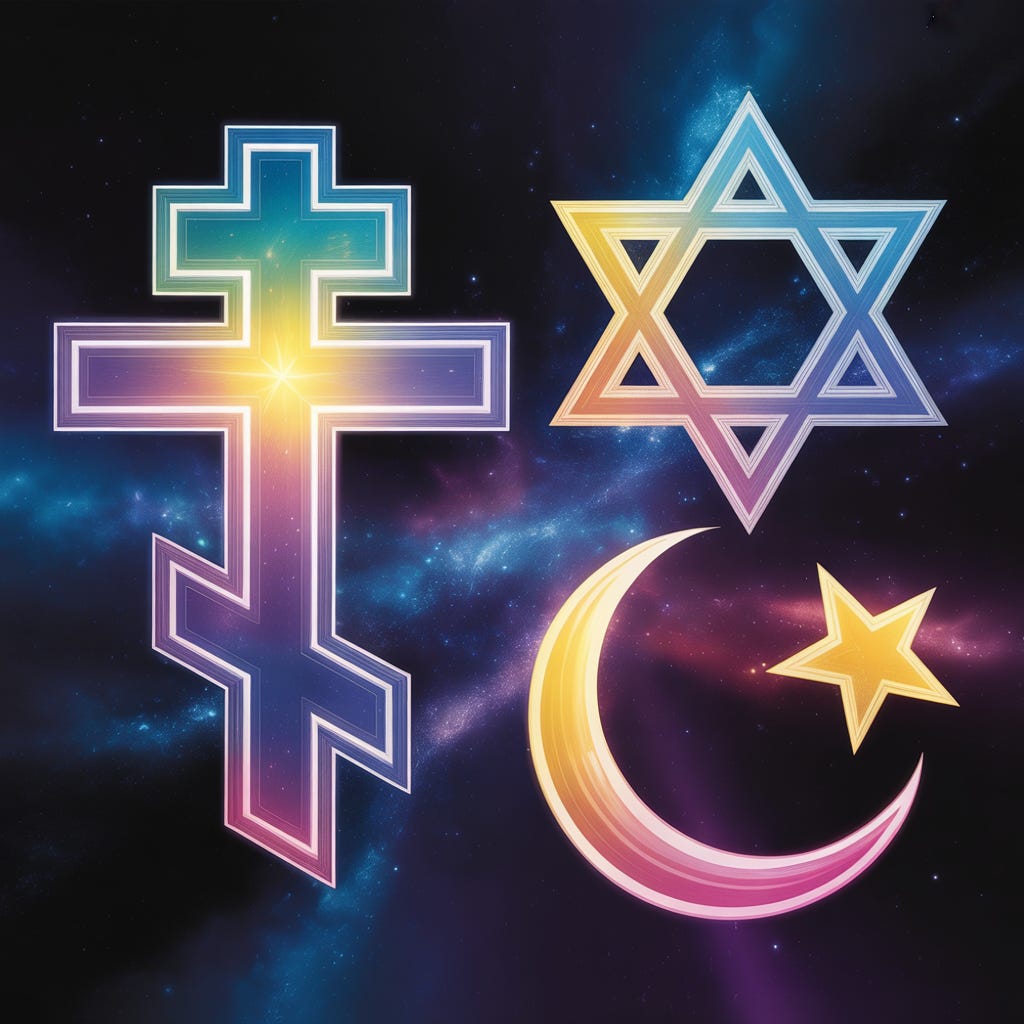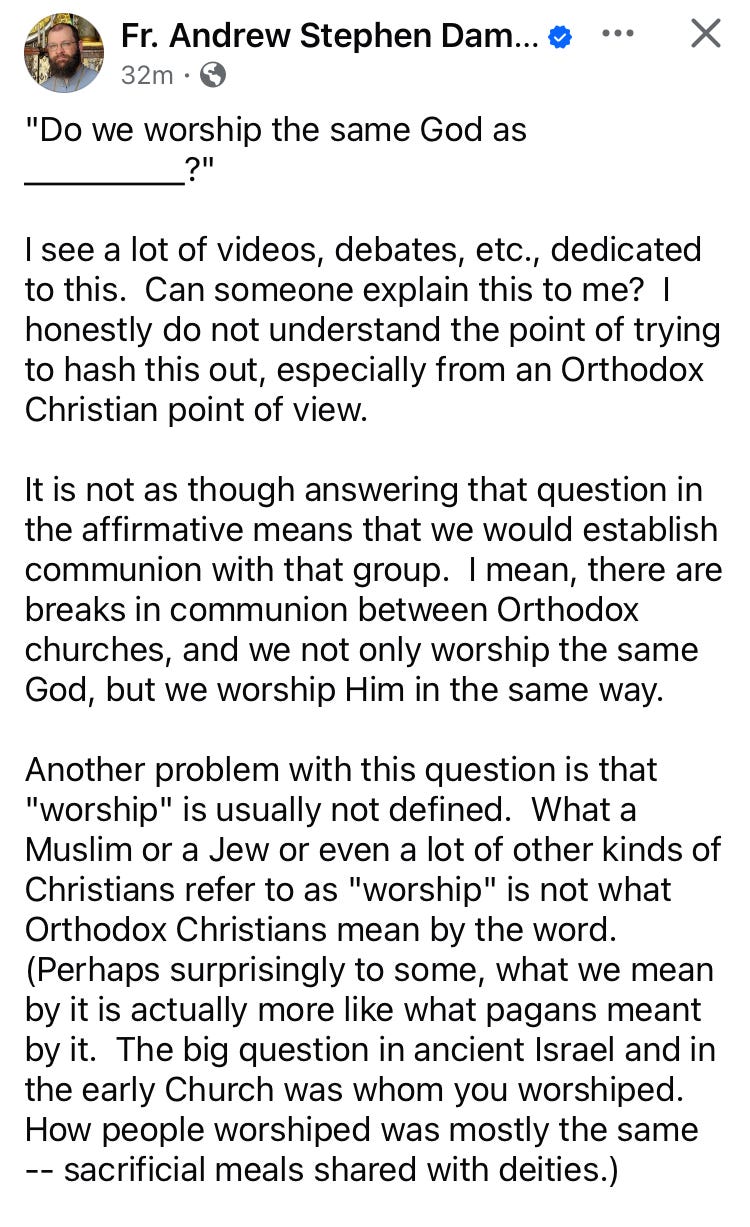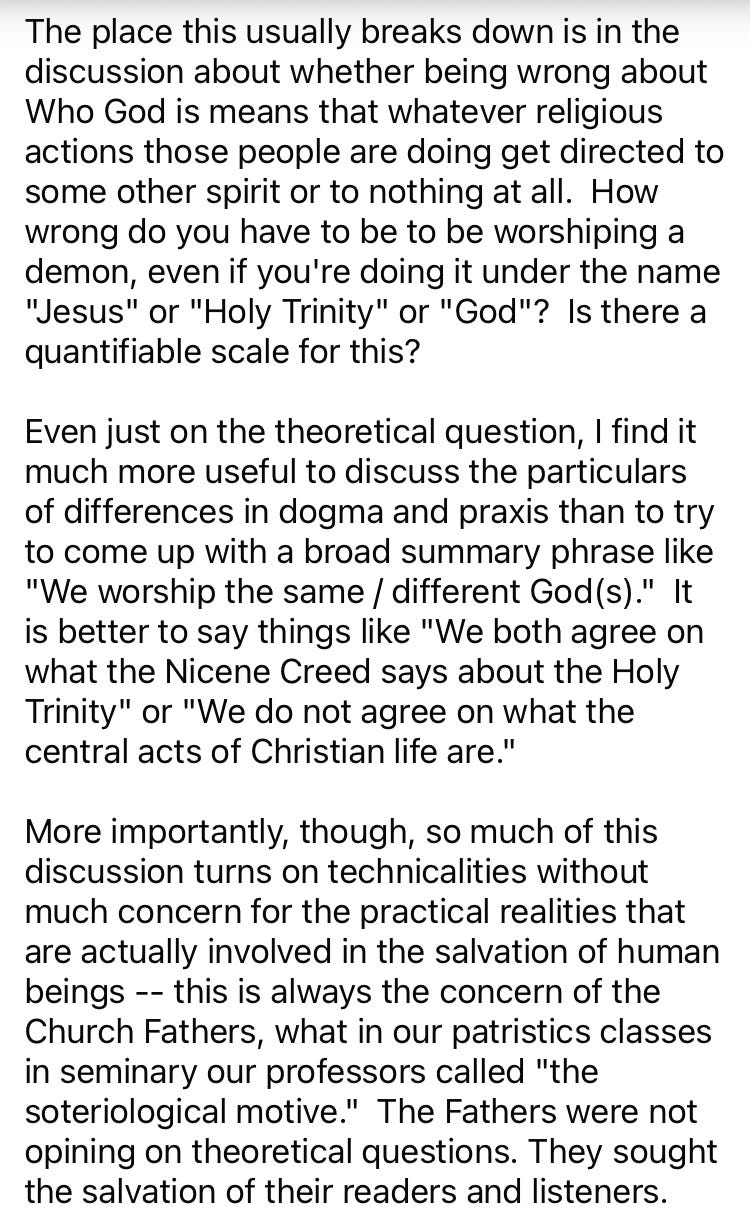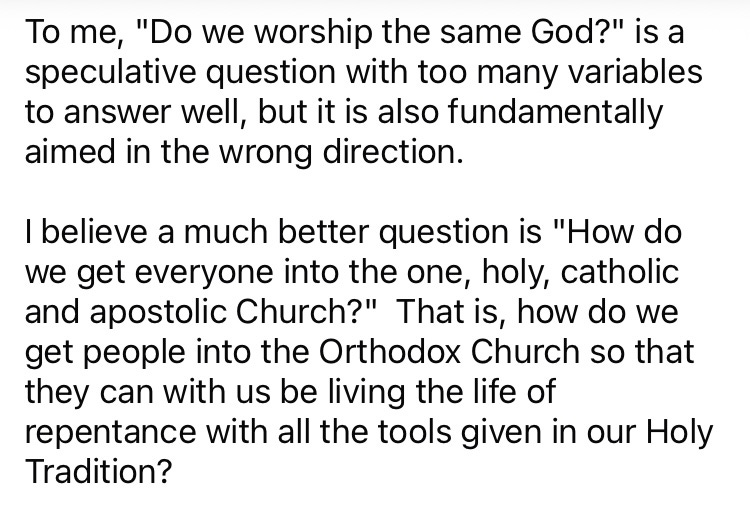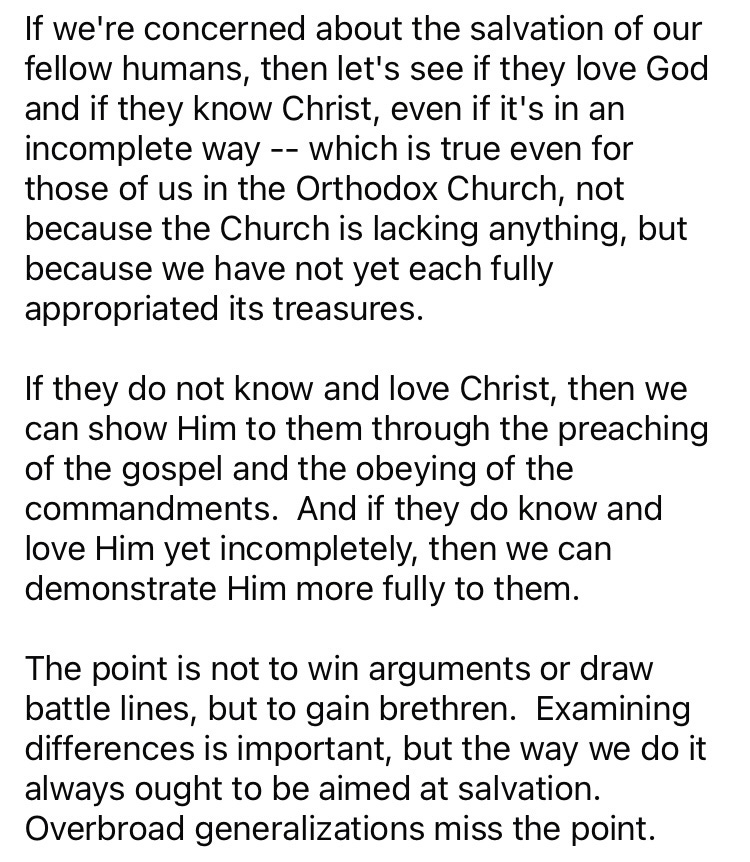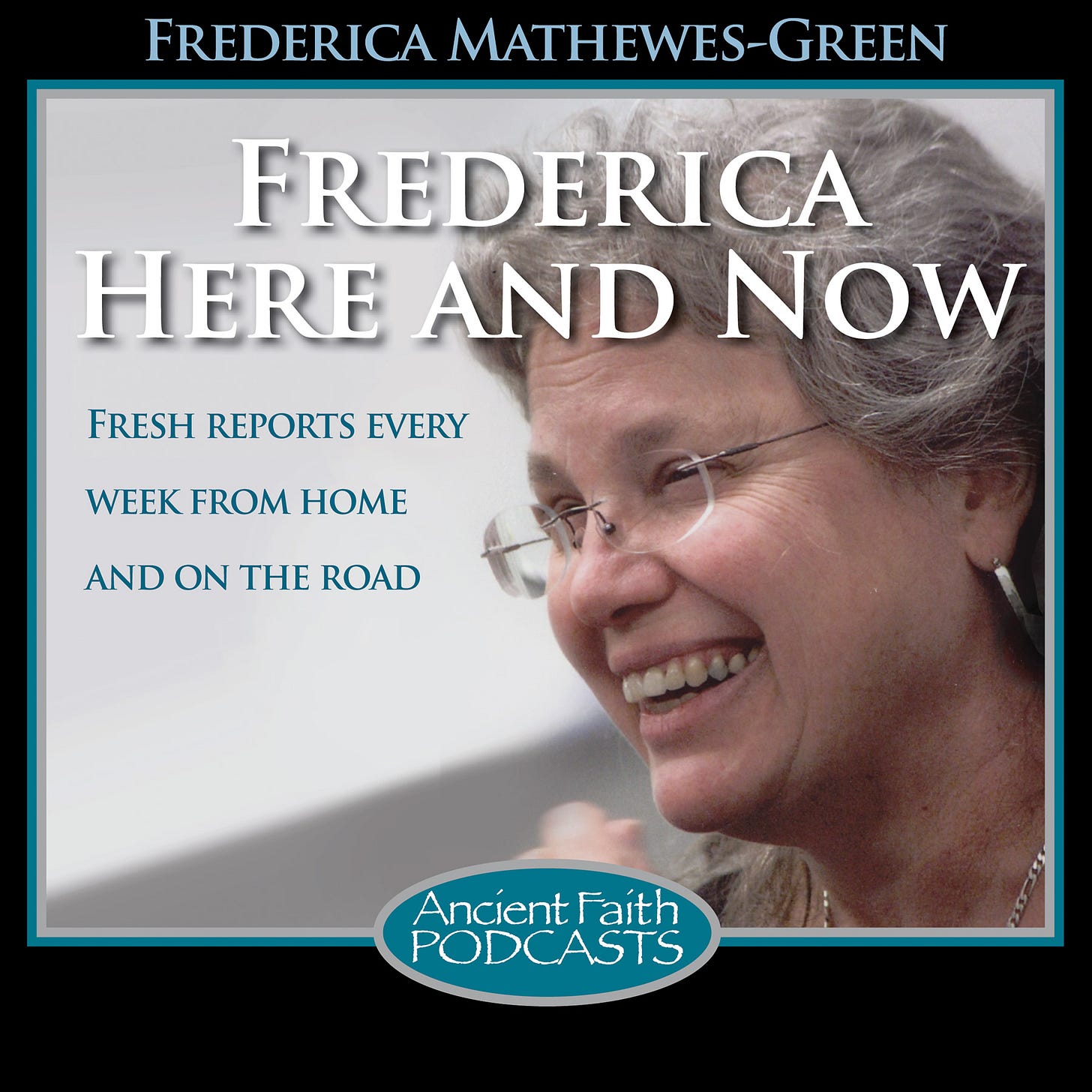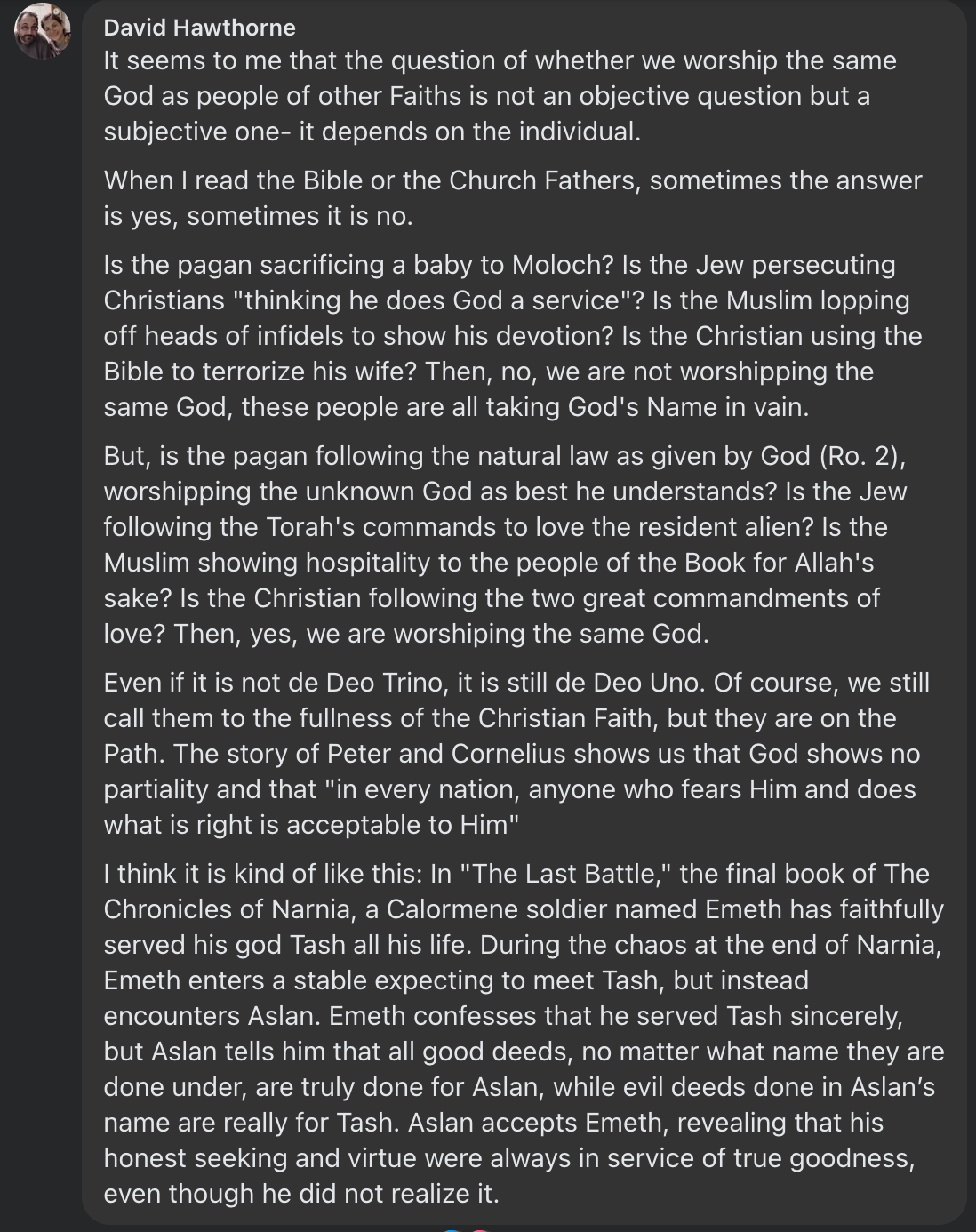Do Orthodox Christians Have the "Same" God as Muslims and Jews?
Overcoming semantics and clearing the fog of this re-ignited debate
Lately, Facebook, X, and other online spaces have been ablaze with Catholic and Orthodox Christians debating a contentious question: do Christians, Muslims, and Jews worship the same God? It’s no surprise that there’s another Orthobro theological cage match, with one side pointing to shared Abrahamic roots and a single divine Creator, while others argue that Orthodoxy’s Trinitarian God—Father, Son, Holy Spirit—is fundamentally different from Islam’s unitarian Allah and the God of Judaism.
Meanwhile, there is nuanced crowd who tries to thread the needle: same Divine target, different doctrinal lenses. But the conversations quickly spiral into accusations of wishy-washy syncretism or fundamentalist rigidity, and too often never even stop to clear up terms. As a result, discussions like this tend to annoy me more than anything, but I occasionally respond to things that impact our parish’s catechumens, and this is one that needs to be addressed.
There is Only One God and He Alone is Holy
As a result, much of the current conversation is mired in semantics. “Well, it depends on what you mean by that” really ought to govern the conversation, but instead people seem to be speaking right past each other. Since we are speaking of God, we are grappling with the heart of faith itself, we’re not just splitting hairs…until we are.
I really appreciate how Father Andrew Stephen Damick put it in this public Facebook post:
A speculative question with many variables—round after round of online debate seems to sheds more heat than light—rooted in issues related to our understanding of worship, with implications on what it means to be an earnest person following after God outside of the Orthodox fold.
“What a Muslim or a Jew or even a lot of other kinds of Christians refer to as 'worship’ is not what Orthodox Christians mean by the word.”
- Fr. Andrew Stephen Damick
Worship: It’s Not Just Vibes
So, “worship” isn’t a one-size-fits-all term. For Orthodox Christians, it’s not just about warm fuzzies toward a higher power or getting a liver quiver while singing a song—it’s a specific, sacramental encounter with the Holy Trinity, as understood in the legacy of the Nicene Creed and articulated through centuries of Tradition.
Muslims, with their strict adherence to a specific form of monotheism, and Jews, with their own unique understanding of God, approach worship differently. The practices, theology, and essence of worship—none of these are interchangeable in these faith traditions.
Here’s Fr. Andrew again:
Orthodox Christians don’t just worship a concept; we worship a specific God revealed through Christ and the Spirit. Get that wrong, and you’re not just missing the mark—you might be aiming at a different target altogether. As Father Andrew observes, we must consider how “wrong” one can be about God before worshiping something else entirely.
The age old question of whom you worship is pivotal; it’s not just about how one worships. Pagans, idolaters, or even well-meaning heretics—get the “who” wrong, and the rest falls apart.
Theological Fault Lines
And yet Romans 1 makes a compelling case that God's nature is evident in creation itself; His attributes are displayed so vividly that even those outside traditional beliefs can catch a glimpse of the truth. This notion suggests that all people, regardless of their theological stance, possess an innate awareness of God.
Let’s hear Saint Paul on Mars Hill to the Greeks (Acts 17:22ff.):
“Men of Athens, I perceive that in every way you are very religious. 23 For as I passed along and observed the objects of your worship, I found also an altar with this inscription: ‘To the unknown god.’ What therefore you worship as unknown, this I proclaim to you. 24 The God who made the world and everything in it, being Lord of heaven and earth, does not live in temples made by man, 25 nor is he served by human hands, as though he needed anything, since he himself gives to all mankind life and breath and everything. 26 And he made from one man every nation of mankind to live on all the face of the earth, having determined allotted periods and the boundaries of their dwelling place, 27 that they should seek God, and perhaps feel their way toward him and find him. Yet he is actually not far from each one of us, 28 for
“‘In him we live and move and have our being’;
as even some of your own poets have said,
“‘For we are indeed his offspring.’
29 Being then God's offspring, we ought not to think that the divine being is like gold or silver or stone, an image formed by the art and imagination of man. 30 The times of ignorance God overlooked, but now he commands all people everywhere to repent, 31 because he has fixed a day on which he will judge the world in righteousness by a man whom he has appointed; and of this he has given assurance to all by raising him from the dead.”
Saint Paul seems to think that God is accessible to anyone seeking Him, that a foundational knowledge of God exists within everyone, and indeed it is possible for idol worshipers to still, apparently, nonetheless have an altar to the one true God unawares. But merely glimpsing this truth does not equate to grasping it.
Here’s where it gets tricky:
Orthodoxy’s Trinitarian view—God as three persons, one essence; the Father is the Fountainhead of Divinity, the Son is the Only-Begotten, and the Holy Spirit eternally proceeding from the Father—is non-negotiable for us.
Islam’s doctrine of Allah, while singular and transcendent, is not the Trinity, and Islam is downright hostile to our views.
Judaism holds a distinct understanding of God as well, emphasizing the oneness and indivisibility of the Divine, and there is plenty of historic rabbinic material clashing with the Christian Gospel.
These aren’t just academic quibbles about God; they shape how each faith experiences, approaches, and relates to God and His world.
What About the Saints?
Take Saint John of Damascus, a stalwart Christian thinker and holy man in the early days of Islam. He didn’t see the new faith as a wholly independent religion born in a vacuum. Instead, he pegged Islam as a particularly potent Christian heresy—a movement that snatched bits of Judeo-Christian scripture, stories, and even moral teachings, yet rejected the deeper mysteries at the core of Orthodox Christian belief, especially the incarnation of God in Christ.
In his eyes, Islam was close enough to Christianity to share spiritual ancestry—borrowing language and themes familiar to the Christian ear—but diverged at crucial points, especially in its understanding of Jesus’s identity and mission.
With this in mind, he boldly suggested Islam’s rejection of the incarnation carried the mark of “antichrist.” Not simply as outright opposition, but as a cunning, distorted shadow of the truth.
A counterfeit is dangerous precisely because it mimics and twists the real thing, its power rooted in how closely it resembles—and diverges from—what came before.
St. Gregory Palamas lived later, but also had plenty of brushes with Islam—he walked the tightrope between genuine dialogue and steadfast conviction, particularly during his time in captivity among Muslims in the Ottoman Empire. He saw that people outside the Church could sincerely seek God, and in his Triads he argued that natural reason and contemplation of the world can lead people to a concept of the Divine—a point echoed in Saint Paul’s teaching (Romans 1). Yet for Palamas, this kind of natural theology is always limited; it serves as a signpost but can’t reveal God’s true essence. In conversations with his Muslim counterparts, Palamas respected their desire to honor the Creator but remained clear that, from an Orthodox standpoint, it’s only through Christ that one can fully enter into communion with God.
So while there’s real overlap in language and longing, the dividing line is crucial: knowledge of God without Christ remains, for Palamas, a search that never quite arrives at its intended destination.
The broader Orthodox tradition has a variety of voices, but in the main seems to be in line with Palamas and the Damascene. Some saints may see more of a shared starting point with Islam; others stress the divide. None pretend the differences—especially Christ’s role—are trivial.
Online, you’ll see quotes yanked out of context to “settle” the debate, but I think we call all agree that Orthodoxy holds firm in this: there’s overlap in seeking God, but the chasm, particularly around Jesus, isn’t something you gloss over.
Salvation Over Semantics
Here’s the kicker: this debate isn’t just about who’s got the better theology. It’s about the meaning of salvation. The Church Fathers weren’t ivory-tower scholars; they were pastors trying to guide souls to God. Father Andrew suggests that instead of endless debates over whether we worship the same God, we’d be better served by asking, “How do we bring people into the fullness of truth?”
Saint Paul’s Mars Hill moment in Acts 17 above serves as a powerful model—using the Greeks’ “Unknown God” to point them to the true God. It was less about winning arguments—and more about building bridges.
I agree with Fr. Andrew’s conclusion. The real question isn’t “Do we worship the same God?” It’s “How do we invite everyone into the one, holy, catholic, and apostolic Church?” Orthodoxy’s answer lies in its sacraments, its lived faith, and its call to encounter Christ. That’s not a cop-out; it’s a shift from heady debates to real-world transformation.
Father Andrew continues:
Finding Common Ground Without Losing Your Edge
So, is there commonality? Sure. Muslims and Jews, like Orthodox Christians, aim for a singular, transcendent Creator. That’s not insignificant.
We are not pretending the differences don’t matter. We are not saying all roads lead to the same summit—nice in theory, but challenging in practice.
Orthodoxy insists on its distinct path: the Trinity, the Incarnation, and the whole sacramental enchilada. Yet it also recognizes that God’s light flickers in unexpected places, even if imperfectly.
The Orthodox mission isn’t to dismiss other faiths but to witness to the truth—through love, not merely logic and multiplication of words in the comment box. Sometimes I see comments online and want to ask, “Did it ever occur to you that this could be said winsomely and with love?”
Father Andrew emphasizes that if we’re concerned about the salvation of our fellow humans, we should affirm them when they say they love God and follow Christ, even if it’s in an incomplete way. He points out that, “If they do know and love Him yet incompletely, then we can demonstrate Him more fully to them.”
Is Part of the Problem in the Phrasing of the Question?
While I was writing this, a friend sent me a relevant podcast episode from 2008 by Frederica Mathewes-Green. She was attending an annual Orthodox Christian gathering, when, during a session, someone raised nearly the same question: Do Muslims and Christians worship the same God?
Mathewes-Green explains that while monotheism means there is only one ultimate God who hears all prayers, the differing theological views of Christians and Muslims about God's nature, especially regarding the Trinity and the divinity of Christ, mark a clear distinction in their understanding. She likens prayers from other religions to children writing letters to Santa Claus: though the intent is genuine, the understanding of God is incomplete or incorrect.
Frederica argues there is no equivalence among all religions in terms of salvation or truth. The Church teaches us that God’s love is universal and patient, that he is capable of hearing prayers from all humanity, and longs for all to come to a knowledge of Jesus Christ. She tells of testimonies of Muslims being drawn to Christianity often through dreams and personal encounters with Christ—that God’s grace is such that He continually seeks to reach all people, regardless of their starting point.
Ultimately, Frederica concludes that the technical answer is yes—Muslims are praying to the one true God, even if their understanding is incomplete, and God responds with love, always hoping to bring them closer to Himself:
I think the problem is in the way the question is phrased, “Are they talking to the same god.” It’s more a question of, what do they understand God to be? Do they think that God is the same as how we think God is? And the answer of course is no. They believe that we don’t understand God correctly. They think that our theology is flawed. They don’t believe in the Trinity. They don’t believe that Christ died and that He rose from the dead. They honor Him, the Muslims especially honor the Mother of God, without agreeing that Christ actually is God in human flesh. And not believing in the death or resurrection, either.
So it’s clear that we don’t believe the same things about God. But as one of the people last night said, really, ultimately, there is only one God. So when we think about other religions we can imagine it sort of like kids writing letters to Santa Claus—these prayers are being offered, but they are not visualizing correctly who the prayers are going to. They’re picturing a different kind of a god. And in some cases, it’s very disturbing, the god that they envision….
So I think that question about, do they worship the same God? Are they praying to the same God? I think the problem is actually in the way the question is phrased. Literally, technically, you would say Yes, they don’t know it, but they are praying to the God of the Trinity, to the God and Father of our Lord Jesus Christ. Because that’s the only God there is.
That’s not what they think they’re doing, of course, but it’s empty up there except for the God of Christian faith. He’s the one that hears it, and He does not hate them or reject them, and He’s always trying to call them to Himself. So I think that question is almost a trick question because of the way it’s set up. But if you envision that it’s the only God there is, it’s like writing those letters to Santa Claus. Our Father, our Father, hears every prayer.
The Bottom Line
This “same God” question isn’t a yes-or-no checkbox. It’s a call to dig deeper into our own faith as Christians—into what worship means, who God is, and how we live out our faith in this world. Our God is not reducible to a construct or a concept, but the self-sustaining, everlasting, ever present Divine being.
Indeed, the great saints also speak of God as one who is beyond being, and that it becomes foolish even to speak of God in great detail:
His transcendent darkness remains hidden from all light and concealed from all knowledge. Someone beholding God and understanding what he saw has not actually seen God himself but rather something of his which has being and which is knowable. For he himself solidly transcends mind and being. He is completely unknown and nonexistent. He exists beyond being and he is known beyond the mind. And this quite positively complete unknowing is knowledge of him who is above everything that is known.
- Pseudo-Dionysius the Areopagite, Letter One: To the monk Gaius
Orthodoxy certainly demands precision about God in our own confession, but also humility in how we treat our neighbors. Instead of drawing battle lines, we should build bridges—not to blur the truth, but to guide others toward it. Because at the end of the day, it’s not about proving we’re right; it’s about helping everyone find the One who is holy.
P.S. I also wanted to share this from the comment section on Father Andrew’s post from Father Deacon David Hawthorne:
P.P.S. Sometimes this discussion also spills over to our views of other Christians. The following video is a helpful tangential presentation if that interests you:



